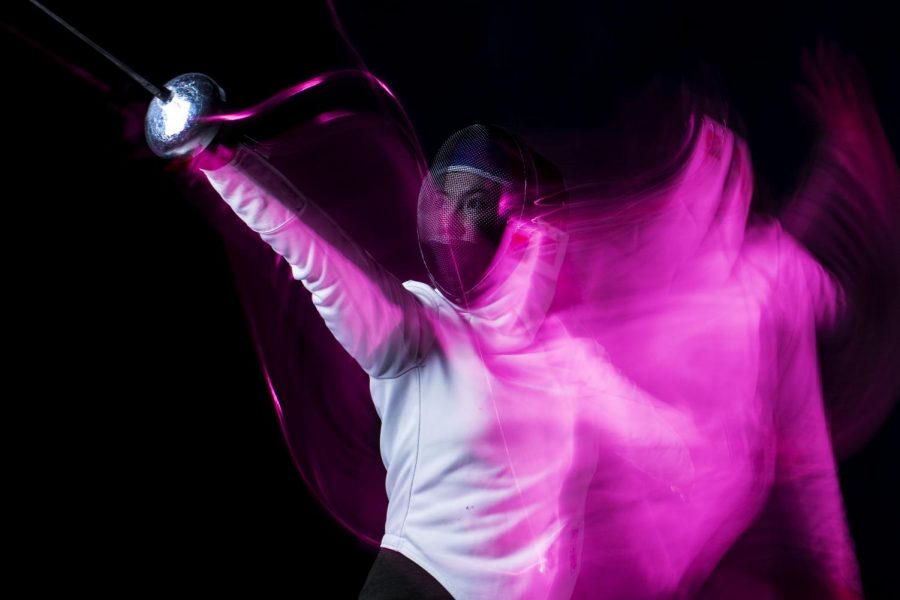Atypical athletes participate in WKU Sport Clubs
February 24, 2015
Some students play basketball, others love football. Then there are those whose entire lives revolve around unique sports.
The Intramural Recreational Sports department offers ways for students to engage in the community on and off campus through fitness-related activities. One way that need is addressed is through the presence of student-led sport clubs, especially important for uncommon athletics.
Harrisburg, Illinois sophomore Chloe Carr, president of both the Brazilian Jiu Jitsu/Judo Club and Fencing Club, joined both sports without previous experience her freshman year and quickly accepted leadership roles when the need arose.
“It’s been awesome,” she said. “Just a lot of, not only … skill growth, but personal growth too — just discipline [regarding BJJ/Judo]. It’s just something really great to be involved with. It’s great exercise.”
Brazilian Jiujitsu is a martial art that focuses on ground fighting, while judo concentrates on throws, using one’s body as leverage to toss a person. The two overlap, however, and are acceptable to use in tournaments. The club’s group of six is instructed by two South American instructors (one from Brazil and the other, Peru) and practices in Preston’s multipurpose room two to three times a week.
“It is focused more on technique than brute strength, which will give a smaller person, if their technique is good, the advantage,” Boston senior and member Nick Fedorka said.
Fedorka started participating in the sport in the fall of 2013 as well, spurred on by his interest in practicing karate with another BJJ/Judo member, as well as knife throwing.
The members would like the retention rate to be higher when it comes to gaining new athletes. They spoke of a typical “influx” of new members during the beginning of the fall semester, but only a few will decide to continue with the sport.
They attributed this to scheduling conflicts and perhaps an uncertainty that comes with a lack of experience with such a sport.
“A lot of the people are like us,” Fedorka said. “They’ve never done any martial arts before, and they get in there and try it and realize it’s not their thing. Other people get in there and try it, and they realize it is their thing. And they have a great time, and those are the people who really consistently come back.”
The group would like to advertise more, as new people bring in variety and different tricks that help better each other. Carr emphasized the ability of the sport to get one out of one’s comfort zone and learn something new.
And at the end of the day, the sport is just fun, according to Fedorka.
“I like fighting,” he said. “I like fighting with my friends, so I fight with my friends and it’s a good time …”
The Fencing Club is easily accessible for unexperienced members as well, Carr said, although it does require a higher level of commitment. New members need to go through the first year of learning foil, which is one of the three weapons used in the sport. The team of 10 practices in the dance studio at Preston, with their three volunteer-based instructors.
Carr enjoys both sports because they both offer something different, although they’re both “like physical chess.”
“I like throwing people, and I like being thrown. I think it’s really fun sport,” she said about Brazilian jiujitsu. “But I like the fast-pacedness of fencing and the whole control of the blade.”
For sports enthusiasts interested in activities that use weapons and supplies an adrenaline rush, the Paintball Club is alive and well.
Chase Brunn, Houston senior and president of the club, is a part of the five-member team that practices and plays on the weekends about twice a month. The group often starts, Saturdays at 11 a.m. at N-tense Sports Recreation Center and play until dark, with competitive practice or tournaments often occurring on Sundays.
This year they’re eager to compete in the PSP Nashville, a national tournament in early May. There, people from all over the country come to participate in the multi-division, multi-level competition.
Most of the events the team plays are along the east coast. The team participates in college-level tournaments like the National Collegiate Paintball Association, as well as regional ones done by South Eastern Paintball Series. In competitions, the five-person teams utilize obstacles to strategically play Capture the Flag and avoid getting hit, because it only takes one shot to be “killed.”
Brunn said they would like to hold a fundraiser to help cover some of the costs incurred by travel expenses, equipment and field and tournament fees, but also to help the organization Impact A Hero.
“It’s a company that helps support veterans and bridge gaps between financial instability due to loss of limbs, surgeries, therapy and what not,” he said. “I worked with them back home, and it’s a good organization.”
Although a costly sport, Brunn has been playing for the past nine years and doesn’t seem to be stopping anytime soon.
As far as any hesitation from potential members goes, “Don’t be scared,” he said. “When you get out there, your adrenaline’s going, you can’t even feel when you get shot … You gotta go out and just enjoy it. How often do you get to shoot someone and not kill them?”



















![Megan Inman of Tennessee cries after embracing Drag performer and transgender advocate Jasmine St. James at the 9th Annual WKU Housing and Residence Life Drag Show at Knicely Conference Center on April 4, 2024. “[The community] was so warm and welcoming when I came out, if it wasn’t for the queens I wouldn’t be here,” Inman said.](https://wkuherald.com/wp-content/uploads/2024/04/smith_von_drag_3-600x419.jpg)


